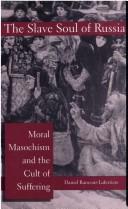| Listing 1 - 3 of 3 |
Sort by
|

ISBN: 0814774822 081477458X 0814769403 0585368287 9780814769409 Year: 1995 Publisher: New York, NY
Abstract | Keywords | Export | Availability | Bookmark
 Loading...
Loading...Choose an application
- Reference Manager
- EndNote
- RefWorks (Direct export to RefWorks)
Why, asks Daniel Rancour-Laferriere in this controversial book, has Russia been a country of suffering? Russian history, religion, folklore, and literature are rife with suffering. The plight of Anna Karenina, the submissiveness of serfs in the 16th and 17th centuries, ancient religious tracts emphasizing humility as the mother of virtues, the trauma of the Bolshevik revolution, the current economic upheavals wracking the country-- these are only a few of the symptoms of what The Slave Soul of Russia identifies as a veritable cult of suffering that has been centuries in the making. Bringing to light dozens of examples of self-defeating activities and behaviors that have become an integral component of the Russian psyche, Rancour-Laferriere convincingly illustrates how masochism has become a fact of everyday life in Russia. Until now, much attention has been paid to the psychology of Russia's leaders and their impact on the country's condition. Here, for the first time, is a compelling portrait of the Russian people's psychology.
National characteristics, Russian. --- Masochism --- Self-destructive behavior --- Russia (Federation) --- Civilization. --- Psychic masochism --- Russian national characteristics --- Self-destructiveness --- Paraphilias --- Personality disorders --- Sadomasochism --- Suffering --- Psychology, Pathological --- History of civilization --- Russia
Book
ISBN: 0801499542 9780801426605 080142660X 1501705415 9781501705410 9780801499548 Year: 2016 Publisher: Ithaca, NY : Cornell University Press,
Abstract | Keywords | Export | Availability | Bookmark
 Loading...
Loading...Choose an application
- Reference Manager
- EndNote
- RefWorks (Direct export to RefWorks)
Why did France spawn the radical poststructuralist rejection of the humanist concept of 'man' as a rational, knowing subject? In this innovative cultural history, Carolyn J. Dean sheds light on the origins of poststructuralist thought, paying particular attention to the reinterpretation of the self by Jacques Lacan, Georges Bataille, and other French thinkers. Arguing that the widely shared belief that the boundaries between self and other had disappeared during the Great War helps explain the genesis of the new concept of the self, Dean examines an array of evidence from medical texts and literary works alike. The Self and Its Pleasures offers a pathbreaking understanding of the boundaries between theory and history.
Philosophical anthropology --- History of civilization --- Bataille, Georges --- Lacan, Jacques --- Criminal psychology --- Masochism --- Self (Philosophy) --- Self --- Philosophy --- Psychic masochism --- Paraphilias --- Personality disorders --- Sadomasochism --- Suffering --- Criminal psychiatry --- Criminals --- Psychology, Criminal --- Criminal anthropology --- Psychology --- Psychology, Pathological --- Personal identity --- Consciousness --- Individuality --- Mind and body --- Personality --- Thought and thinking --- Will --- History --- Angélique, Pierre, --- Auch, --- Lord Auch, --- Bataiyu, Joruju, --- Bataiyu, G., --- בטאיי, ז׳ורז׳, --- France --- Intellectual life --- LITERARY CRITICISM / Semiotics & Theory. --- Angélique, Pierre --- Lord Auch --- Bataiyu, Joruju --- Bataiyu, G. --- Psychoanalyse --- History. --- psychoanalytische theorie. --- Bataille, Georges, --- Lacan, Jacques,
Book
ISBN: 9781526106117 1526106116 9781526124098 1526124092 9781526106124 1526106124 Year: 2017 Publisher: Manchester Manchester University Press
Abstract | Keywords | Export | Availability | Bookmark
 Loading...
Loading...Choose an application
- Reference Manager
- EndNote
- RefWorks (Direct export to RefWorks)
This collection tells the story of the case study genre at a time when it became the genre par excellence for discussing human sexuality across the humanities and life sciences. It is a transcontinental journey from the imperial world of fin-de-siecle Central Europe to the interwar metropolises of Weimar Germany and to the United States of America in the post-war years. Foregrounding the figures of case study pioneers, and highlighting their often radical engagements with the genre, the book scrutinises the case writing practices of Sigmund Freud and his predecessor sexologist Richard von Krafft-Ebing; writers including Leopold von Sacher-Masoch and Alfred Doblin; Weimar intellectuals such as Erich Wulffen and psychoanalyst Viola Bernard. The results are important new insights into the continuing legacy of such writers and into the agency increasingly claimed by the readerships that emerged with the development of modernity.
Sexology. --- Psychoanalysis. --- Knowledge, Sociology of. --- Case method. --- Psychoanalysis --- Sexology --- Humanities --- Sociology --- Case method --- Case studies. --- Case studies --- History. --- Case history method --- Case study method --- Education --- Knowledge, Theory of (Sociology) --- Sociology of knowledge --- Communication --- Knowledge, Theory of --- Public opinion --- Social epistemology --- Sex --- Social theory --- Social sciences --- Learning and scholarship --- Classical education --- Psychology --- Psychology, Pathological --- History --- Methodology --- Historiography --- Literature --- Alfred Döblin --- Case study --- Leopold von Sacher-Masoch --- Psychiatry --- Richard von Krafft-Ebing --- Sadomasochism --- Sigmund Freud
| Listing 1 - 3 of 3 |
Sort by
|

 Search
Search Feedback
Feedback About UniCat
About UniCat  Help
Help News
News